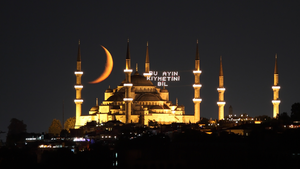
Ramadan
The ninth month of the Muslim Calendar.
A time of fast, prayer and spiritual reflection.
About the Event
Celebrating the first revelation of Muhammed, Ramadan is the ninth month of the Islamic Calendar. It is a month of fasting, prayer, restraint from tobacco, sexual relations and sinful behavior. Muslims worldwide forgo food and drink during the day. Fast is broken at a pre-dawn meal called suhur and a post-dusk feast called iftar. It is compulsory for all healthy enough Muslims to take part.
The most important night in Ramadan, and the Muslim calendar as a whole, is Laylat al-Qadr otherwise known as the Night of Destiny, the Night of Decree or the Night of Power. Occurring on one of the odd numbered nights on the last ten days of Ramadan, it signifies the night in which Muhammed received the first verses of the Quran from God.
Ramadan ends with the holiday of Eid-al-Fitr which celebrates breaking the fast and the return to normal life.
How to approach it
This is a great opportunity to recognise the important observance of this month with Muslim students at the same time as introducing Ramadan and Muslim traditions to other members of your class. Tell the story of Muhammed’s first revelation in class, share pictures of what observing Ramadan or Lalylat al-Qadr looks like. Ask students to think through why Ramadan is so important to Muslims. What does it signify for them? If you have Muslims students that are confident enough, you could invite them to share their experience of Ramadan with the class.
Conversation starter
Ramadan is a month that celebrates the first revelation of Muhammed. Muslims around the world fast and pray to help them reflect on the teachings of Islam. Do you ever take time to be quiet and reflect on your own thoughts too? Do you think this is similar to Ramadan? Are there any differences?
